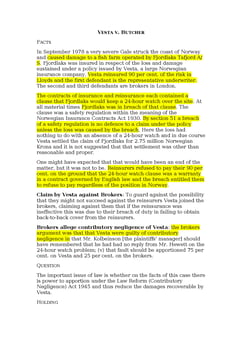Smith New Court v Scrimgeour Vickers [1997] AC 254
Judgement for the case Smith New Court v Scrimgeour Vickers
KEY POINTS
The principles for assessing damages in cases where the plaintiff has been induced by fraudulent misrepresentation to purchase property are as follows (Lord Browne-Wilkinson):
(1) the defendant is bound to make reparation for all the damage directly flowing from the transaction;
(2) although such damage need not have been foreseeable, it must have been directly caused by the transaction;
(3) in assessing such damage, the plaintiff is entitled to recover by way of damages the full price paid by him, but he must give credit for any benefits which he has received as a result of the transaction;
(4) as a general rule, the benefits received by him include the market value of the property acquired as at the date of acquisition; but such general rule is not to be inflexibly applied where to do so would prevent him obtaining full compensation for the wrong suffered;
(5) although the circumstances in which the general rule should not apply cannot be comprehensively stated, it will normally not apply where either (a) the misrepresentation has continued to operate after the date of the acquisition of the asset so as to induce the plaintiff to retain the asset or (b) the circumstances of the case are such that the plaintiff is, by reason of the fraud, locked into the property;
(6) In addition, the plaintiff is entitled to recover consequential losses caused by the transaction; and (7) the plaintiff must take all reasonable steps to mitigate his loss once he has discovered the fraud.
FACTS
Smith purchased Ferranti shares as a market-making risk, intending to hold them for a relatively long period before selling. This purchase was influenced by the Roberts fraud. This approach differed from a "bought deal" where shares are bought for quick resale to clients.
The judge found that due to the fraud, Smith bought the shares for a longer duration and would not have acquired them under a "bought deal" scenario. Following the purchase, Ferranti's shares experienced various developments. Ferranti's Annual Reports confirmed results mentioned in a preliminary announcement.
Later, a restatement of 1989 accounts was necessary due to new information, resulting in a suspension of share dealing. After revealing the fraud, trading resumed. Smith initially retained the shares but gradually sold them at lower prices, incurring substantial losses.
COMMENTARY
The case serves as a reminder of the legal principles that govern market activities and the potential liabilities that can arise from misleading practices and misrepresentation in financial transactions.
ORIGINAL ANALYSIS
-
Defendant fraudulently induced Plaintiff to buy shares which lost value
When the fraud was discovered;
When a larger existing fraud was discovered;
When, due to feasibility, they could not sell the property straight away and as a result they kept shares whose value was falling.
They ultimately sold the property and HL awarded damages for the amount paid minus the amount sold.
The “existing flaws” of the property and the fact that Plaintiff was “locked in” to the property (they could not feasibly sell straight away) would not be taken into account in reducing the loss compensable by Defendant.
HL held that Defendant had to compensate for all the damages flowing directly from the transaction and “reasonable foreseeability” was irrelevant. In general Plaintiff could recover the price he paid minus benefits e.g. market value of property acquired.
Benefits sometimes do not have to be discounted where the parties are locked into the property or the fraud has continued so as to induce their retention of the property. Impossible to state all circumstances where they don’t have to be discounted.
Consequential losses are compensable but there is a duty to mitigate on Plaintiff. Because here Plaintiff was locked into the property, the compensation was the difference between the amount paid by Plaintiff and the amount they recovered through the sale, NOT the value of the shares as soon as the fraud was discovered.
Lord Browne-Wilkinson
As a general rule, the benefits received by Plaintiff [to be reduced form the assessment of compensation] include the market value of the property acquired as at the date of acquisition; but such general rule is not to be inflexibly applied where to do so would prevent him obtaining full compensation for the wrong suffered.
He supports conclusion of Doyle.
This includes cases where, for example, the fraud continues after contract formation or the party is locked in to the property.
Lord Steyn
Justification for Doyle rule that makes negligent misrepresentation claims subject to a remoteness test but not deceit claims is that deceit (which is committed intentionally) is worse that negligence (which can be committed by carelessness) and it is therefore better to make the intentional wrongdoer subject to wider liability, partly as a matter of making liability fit the wrongdoing, partly as a deterrent.
RELATED CASES
For Further Study on Smith New Court v Scrimgeour Vickers

These are detailed case summaries (excerpts from cases - not paraphrase...
Need instant answers? Our AI exam tutor is here to help.
Ask questions 🙋 Get answers 📔 It's simple 👁️👄👁️
Our AI is educated by the highest scoring students across all subjects and schools. Join hundreds of your peers today.
Get StartedSimilar Cases
Related Product Samples
These product samples contain the same concepts we cover in this case.
| Contract Law | Misrepresentation Notes (24 pages) |
| Contract Law | Misrepresentation Notes (15 pages) |
| Commercial Remedies BCL | Smith New Court Securities V. Vickers Notes (3 pages) |

 Since 2010, Oxbridge Notes has been a trusted education marketplace, supplying high-quality materials from top achievers at universities like Oxford, Cambridge, LSE, Harvard, and Yale.
Since 2010, Oxbridge Notes has been a trusted education marketplace, supplying high-quality materials from top achievers at universities like Oxford, Cambridge, LSE, Harvard, and Yale.